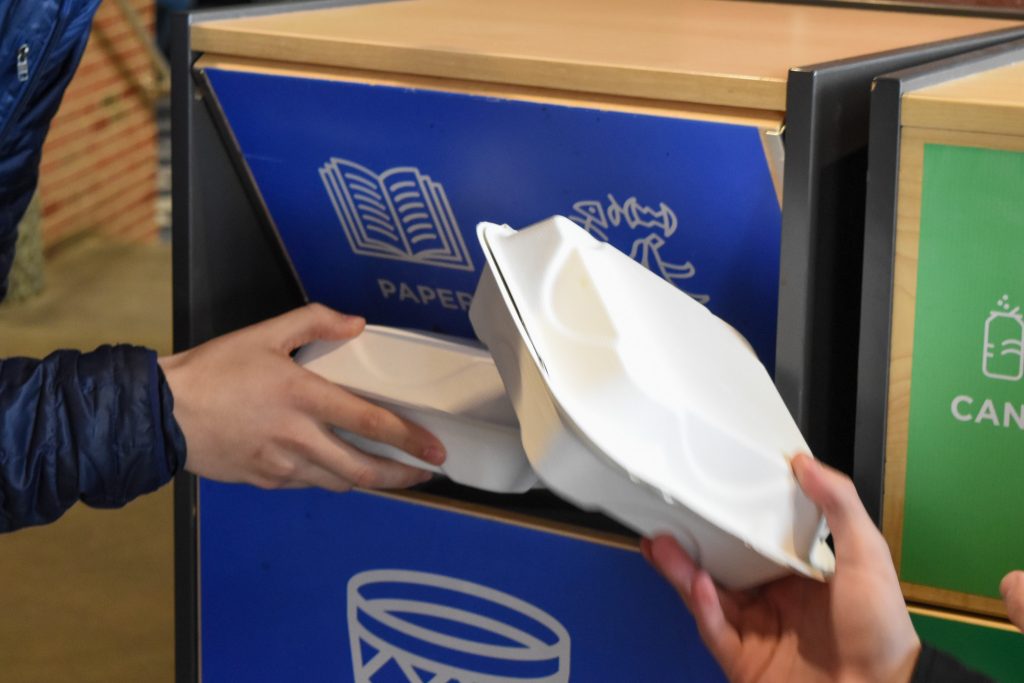Binghamton University is participating in the Campus Race to Zero Waste competition.
Formerly known as RecycleMania, the Campus Race to Zero Waste competition is held annually from January to March to promote waste reduction practices among organizations of higher education across the United States and Canada. Participating organizations practice waste management, submit waste update reports and attend informational webinars organized by the National Wildlife Federation (NWF) — the largest wildlife conservation in the United States and the coordinator of the competition.
The competition consists of six categories — zero waste, food organics, diversion, recycling, GameDay basketball and electronics recycling. BU — which has been a participant for over a decade — is in the competitive division, meaning a report of campus recycling and waste data is made weekly and compared with other competitive organizations reports. Competitors are ranked based on “diversion rate,” which is an organization’s “weekly recycling rate,” according to the Campus Race to Zero Waste website. BU is currently ranked in 50th place, with a diversion rate of 16.958 percent.
The University’s Office of Recycling and Resource Management is responsible for tracking the campus’ waste data.
Martin Larocca, the resource recovery manager of the office, has been participating since 2011 by reporting the collected campus data, presenting to campus organizations about recycling and reserving tabling events. Larocca explained how students can partake in the competition.
“The biggest help from [BU] students would be making sure that what they put in the recycling container is actually recyclable,” Larocca said. “Our website has up-to-date information on what is recyclable along with other services we provide.”
Kristy Jones, the director of higher education programs at NWF and manager of the Campus Race to Zero Waste competition, said the competition has prevented the production of nearly 1.68 million metric tons of carbon dioxide equivalent, which equals the removal of nearly 346,000 gas engine passenger vehicles. Jones further explained the significance of sorting waste, including the side effects of landfill use.
“It’s important to divert as much waste from landfills as possible,” Jones wrote in an email. “New landfills not only require the clearing of land, but oftentimes waste in the landfill leaks into the groundwater and nearby environment, contaminating drinking water and food supply.”
A student-run organization has taken part in the competition as well.
The students in Zero Hour Binghamton, an environmental justice organization, are the University’s campus liaison between students and administrators. The organization will be holding waste reduction workshops throughout the semester and is responsible for sharing the competition rules with the campus community.
Jacob Weber, an intern for the Zero Hour Binghamton E-Board and a sophomore double-majoring in philosophy, politics and law and environmental studies, said sustainability competitions are important for a number of reasons beyond waste management.
“Sustainability competitions like the Race to Zero Waste are important not only because they provide an incentive for campuses and municipalities across the country to better their environmental practices,” Weber wrote in an email. “But they also serve to showcase the potential of these communities to create change and set the precedent for sustainability programs in the future by providing a model of what they could look like and how they could operate in a community.”
Weber also offered sustainability advice for students looking to promote environmental change, which included “cutting [out] single-use items,” turning off lights and electronics, “refusing to shop at retailers with a large environmental footprint,” voting in favor of the environment and — as the competition also supports — recycling.
Maisy Chang, a sophomore majoring in biology, expressed pride in the University for partaking in the competition.
“I think sustainability is really important and I am glad the University is taking efforts to help out with sustainability efforts,” Chang said. “If [competitions] are going to increase efforts everywhere, like throughout all the [United States] and anywhere else, then that’s good. They are competing for a good cause.”



